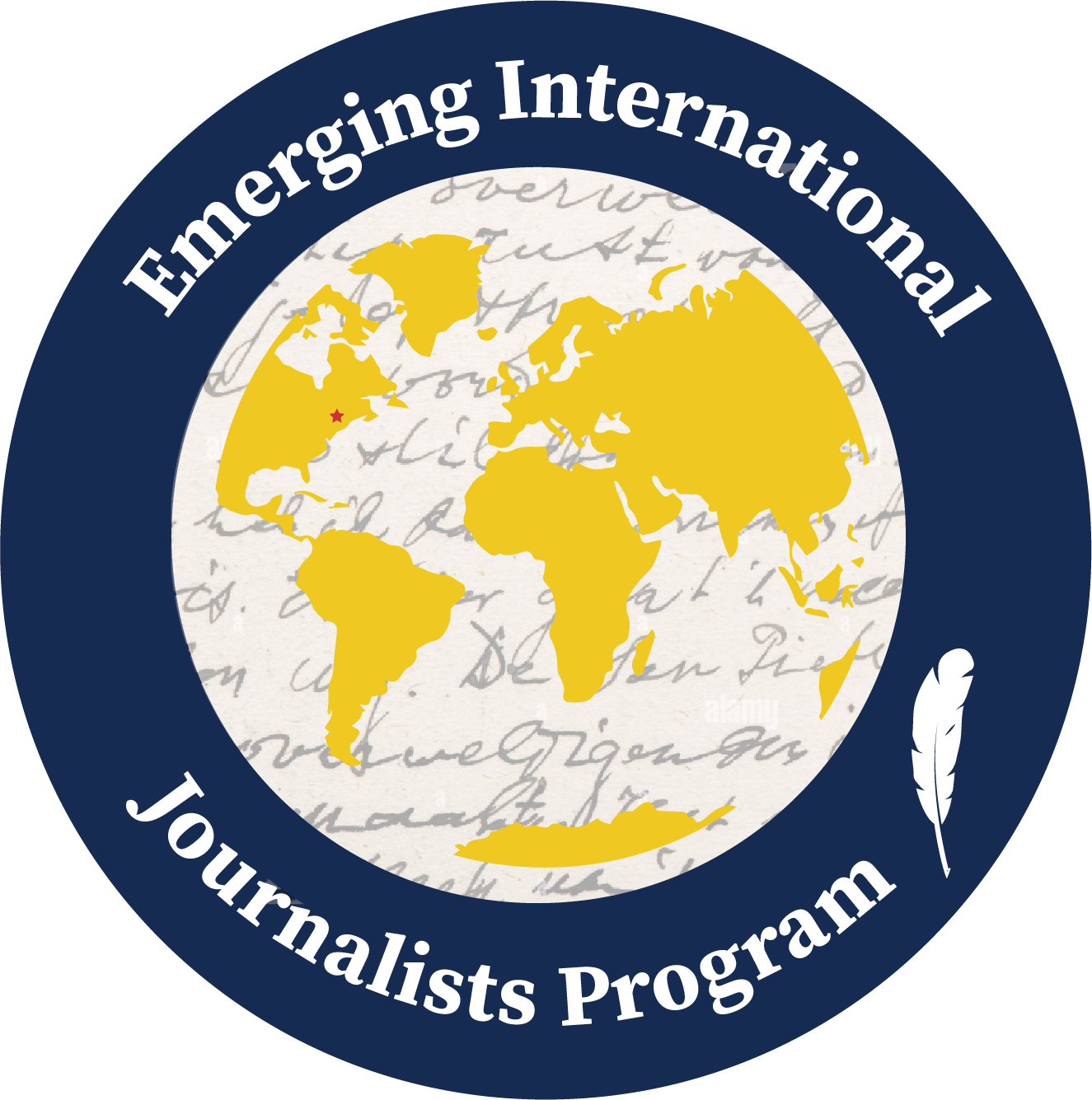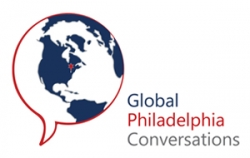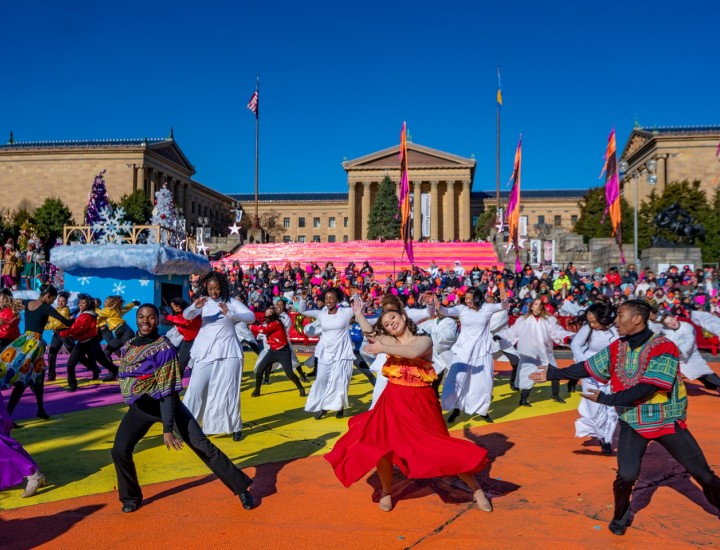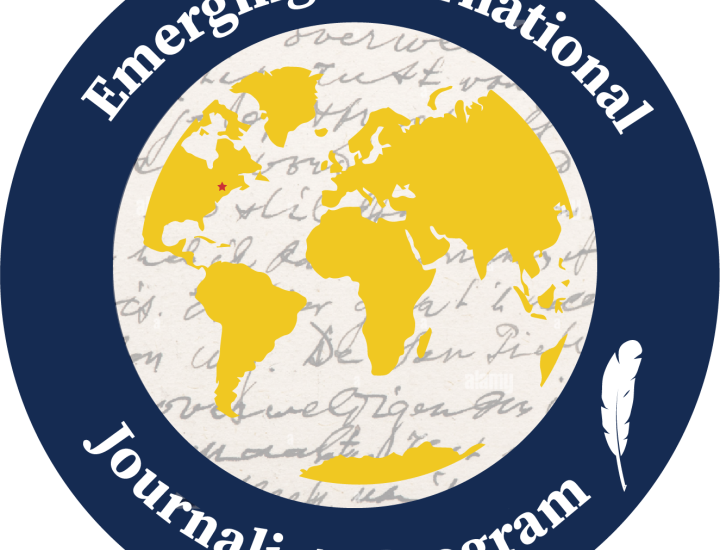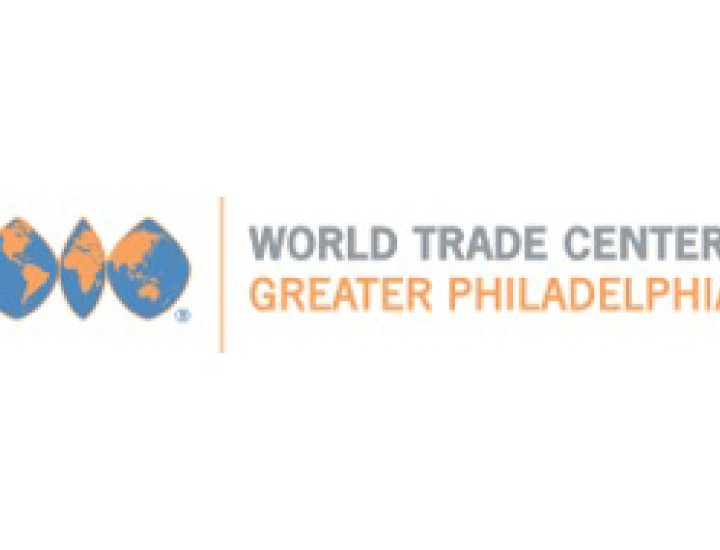From basketball to business: How World Trade Center CEO Thomas Young is growing Philly’s global profile
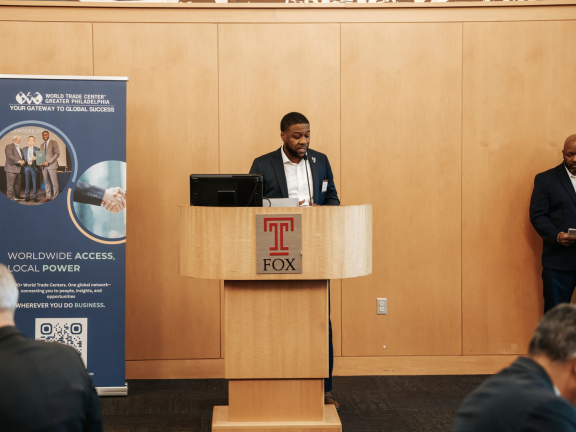
Despite being only two years into his role as president and CEO of the World Trade Center of Greater Philadelphia, Philly native Thomas Young has already secured one of the most significant opportunities to expand the city’s identity as a hub for global business.
This past April, Young traveled to Marseille, France for the World Trade Center Association Global Business Forum. At the event, Young proudly announced that the next forum will be held in Philadelphia in 2026. The event will bring the over 300 World Trade Centers across the world together to explore what the city has to offer in terms of opportunities for business partnerships and engage potential investors.
But this wasn’t the first time travel played an important role in Young’s career.
For Young — who was named last year Philadelphia Business Journal 40 Under 40 list and is also a member of Global Philadelphia Association’s Board of Directors —international experiences have shaped his professional life and goes all the way back to when he played professional basketball in Germany after graduating college.
In this edition of our Young Professional Travel Series, GPA got to speak with Young about his global experiences, his work at the World Trade Center and what is in store for the future of Philly’s business landscape — including the upcoming Global Business Forum and the city’s semiquincentennial celebration.
Julia Boehning: First, tell me a little bit about your professional background and your work at the World Trade Center of Greater Philadelphia.
Thomas Young: I’ve been at the WTC as the President CEO for two years now. Prior to that, I was a government lobbyist, but I also had other parts of my job. I had a portfolio of minority-owned business clients that we helped get procurement opportunities and government contracts for. And I was also the chair liaison to Cherelle Parker, who was the Delaware River Port Authority board chair at the time. Working backwards from there, I spent six years in the State House; I was the chief of staff to a state representative at the time. Prior to that, I was in a completely different world. I lived in Germany for a couple of years playing professional basketball, which is where I initially got the international bug to travel for work.
JB: Part of the World Trade Center’s mission is to “simplify global growth” for businesses in the greater Philadelphia area. What strategies does your team employ to achieve this goal?
TY: I like to consider us a wraparound service where we’re helping our local businesses grow on the international scene. We’ll help you look for different marketplaces to tap into, do some market research and let you know some of the on-the-ground customs that go on. Then, we also help companies logistically. If you have a product that is moving back and forth, and if there are any logistical issues that are on the ground or in the air, we help with some of that as well before it gets to its destination. We help businesses on the front end identify places to go, and then on the back end with any logistical needs.
JB: You briefly touched on this, but could elaborate on what sparked your interest in traveling abroad and creating global connections for Philadelphia?
TY: What sparked my interest in traveling abroad was my time living in Germany. It really illuminated global affairs to me in a sense that the world is a very big place, and there’s a lot going on. There are different customs and different traditions and different backgrounds that we appreciate to an extent here in the United States, but I think for anybody to fully appreciate these differences around the world, you have to actually be in a place. For me, there’s a difference between traveling to a place to visit versus actually having to live in a different culture and having to adapt yourself to their customs. That’s where the original bug came in for me, of wanting to learn more about international business, international affairs, but also understanding that to get there, I have to actually be on the ground at those places.
JB: And is there any experience that you had in those early years in Germany that shaped your approach at the World Trade Center? Anything that sticks out in your mind as a moment that really exemplified this point to you?
TY: While I was living there, I played professional basketball. I had teammates that were obviously from Germany, and they opened up my eyes to Europe’s view of America — it’s like we’re the little brother who thinks we know it all until things happen to us. For them, it’s like, “Look, you guys have only been around for 250 years,” whereas you have certain European countries that have been around for centuries upon centuries. So for me, it was really important having that outside look and understanding what we look like to the rest of the world. I would not have known that if I didn’t travel abroad.
JB: Since that first moment where you said you got that “itch” to incorporate global travel into your work, you’ve had a lot of different experiences traveling abroad. Is there any particular international trip that stands out in your mind?
TY: I would say my recent trip to Ghana was really illuminating for me. It was really eye opening. As an African American man, I don’t know my background fully because of slavery and all of those situations. Being back in Africa gave me a sense of being home, but it also helped me understand what the work life looked like on the ground there — which really helped me understand how to navigate their business world and identify opportunities for Pennsylvania and Philadelphia to be connected to countries in West Africa. One of Pennsylvania’s biggest industries is agriculture, and that is one of their biggest industries as well. I wanted to figure out ways we can tap into our strengths on both sides and build partnerships. I didn’t realize the partnerships were so greatly desired and needed in Africa until I got there. I met with the president and the vice president, who initially invited us, and got to see what their vision is for the country. That was the biggest eye opener for me, traveling abroad and saying: “OK, I have a clear vision of how this partnership can be married to one another in terms of industries.”
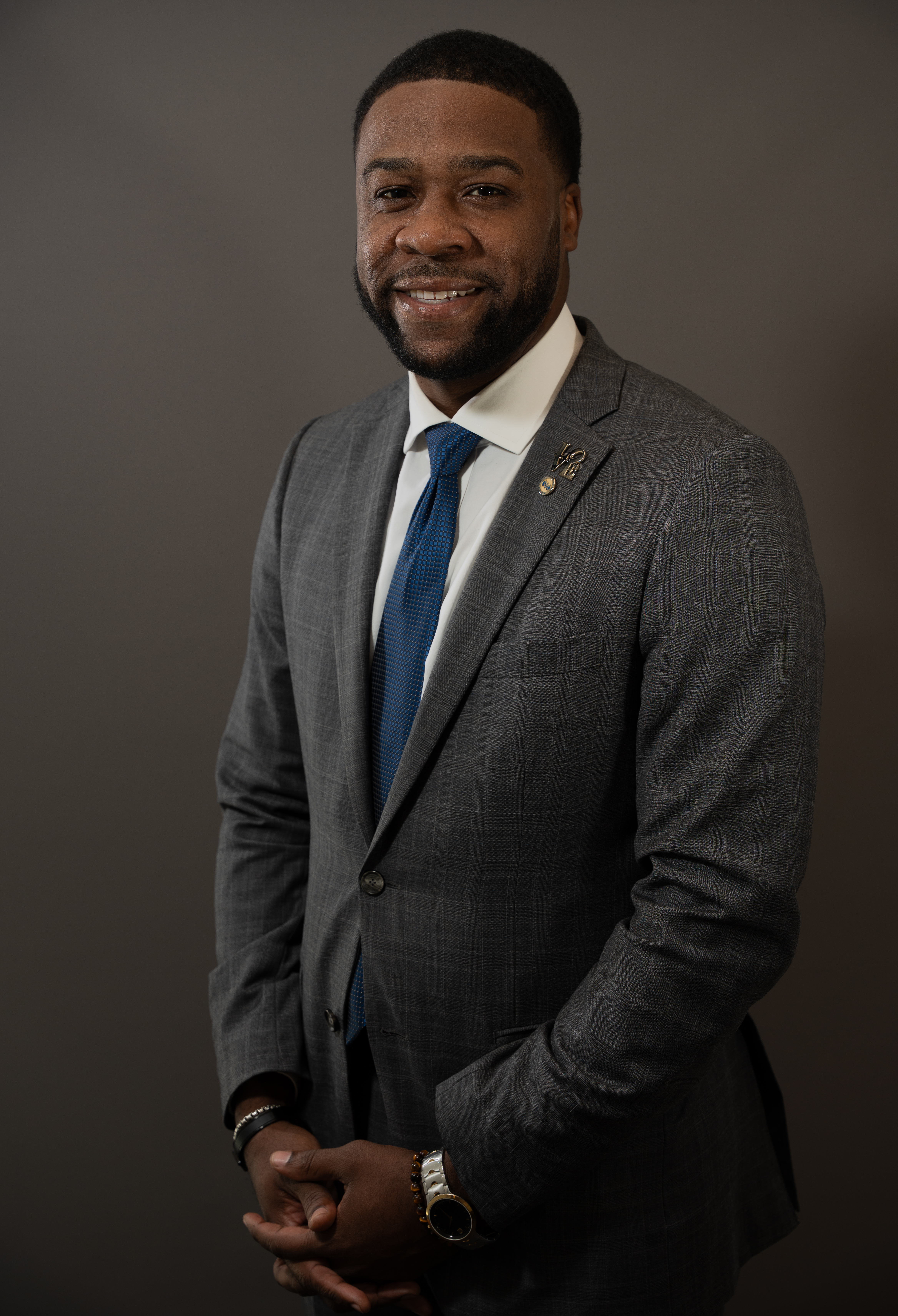
JB: And I know that, also this year, you traveled to Marseille, France for the World Trade Center Association Global Business Forum, where it was also announced that Philadelphia would be its host for 2026. What is the significance of Philadelphia being chosen for this honor?
TY: The significance is huge. This event is bringing all 300+ World Trade Centers from over 90 countries around the world to Philadelphia to look at the city for business, and to bring their investors and their businesses to Philadelphia for matchmaking opportunities. When recently talking to our former CEO, who was here for 13 years before me, she said: “This is the biggest event that we’ve had in the history of our organization, of over 20 years.” That explains, right then and there, what the significance is.
We had to bid on this early in 2024, so I was less than a year within my position. And in the bidding, I had to sell Philadelphia. Why should Philadelphia host this event? Because, looking at previous forums, they were in Accra, Ghana, and then in Bengaluru, India, and then Marseille, France. So we had to look and say, “Why do we want it to be in Philadelphia?” Part of that was celebrating the fact that we are the birthplace of American democracy, and highlighting that the 250th birthday of America is going to be huge here in Philadelphia — as well as all of the other international events we have here next year: we’re talking about FIFA, we’re talking about the MLB All-Star Game, the PGA Tour. We’re looking at all of these events and saying Philadelphia is going to be the place when it comes to any global affairs. We wanted to add on a global business conference to go with the global sports and the global tourism that’ll be here.
With our proximity to New York and D.C. to Philadelphia, we sit in a perfect place for companies looking to enter into the United States or doing business in the Northeast Corridor. We sold them on that. We sold them on all the international events that are going on next year and on looking at Philadelphia’s growing global presence. And this event, this Global Business Forum, is going to help skyrocket that even more when we’re talking about the international business scene.
JB: And looking more broadly ahead, what are you most optimistic for when it comes to the future of Philadelphia’s evolving identity as a global business hub?
TY: I am like a hopeless romantic when it comes to Philadelphia’s future. I really believe in our city, our region, our people and our businesses that are here. And I believe that, moving into the future, people are starting to realize that we don’t talk about Philadelphia enough. That’s where I see the future of Philadelphia going, a future where the world sees Philadelphia’s potential. We have a great mixture of young leaders who want to see Philadelphia move into the future when we’re talking about the business industry. But also we have leaders who have seen our region transform multiple times over. When we’re looking at the 90s, when we kind of re-identified ourselves, that type of Renaissance is coming. Part of that is not just looking regionally — saying, “How can we prop ourselves up to the region?” — but now looking globally and saying, “How can we prop ourselves up to the world?”
JB: And looking more broadly at the idea of travel and how it has influenced these new initiatives, what advice would you give to young, Philadelphia professionals who may be embarking on their first international travels?
TY: Be like water in the sense of always being flexible, keeping an open mind, and being open to new ventures. When I played basketball in Germany 13 years ago, my first thought wasn’t, “Oh, let me go to Germany because I want to be the president and CEO of the World Trade Center.” There were points in my life where I had to make a choice to venture down a pathway of the unknown or play it safe. And a lot of that was drifting down a pathway of the unknown because I wanted to see where it would take me. I graduated college with a sociology degree, nothing to do with international business whatsoever, but my work experience that started in that way eventually morphed into international business. I kept an open mind and kept the flexibility of going after a new venture.
JB: Could you share an example of one of those times in your life where you jumped into this idea of the unknown?
TY: Yes, after my second year of playing basketball, I came home and I had a conversation with my brother through Big Brothers Big Sisters, and he said, “I know your 10 year plan, which is to play basketball for the next 10 years and figure it out. But what’s your 30 year plan?” And I was like, “30 year plan? Dude, I’m 24. I don't care about a 30 year plan.” I’m coming back from Germany. I love the life I'm living. I want to keep traveling and playing basketball and doing what I love. But the more I thought about it that summer, the more it made sense to me. What he essentially said was, “You’ll come back after 10 years of playing basketball, and you’ll be playing 10 years of catch-up to everyone that is your age, or you can retire now, get into the next stage of your life.”
So, after the summer, I ended up retiring from basketball and not going back. All I knew was I wanted to help people. I went from coaching then got into government. Government led me to being a lobbyist, and then lobbyist led me to being in this position because the Board of Directors for the WTC wanted to bring my boss onto their board, and my boss said he couldn’t do it but he’ll give his number two, which was me. I could have turned it down because I had no experience in international business, but I decided to do it because I figured it’d be a new venture.
Fast forward a year and a half after being on the board, I built the relationships to the point where they felt confident to bring me in as the CEO — which was never part of the plan — but it became part of the plan after those steps. I gave up my passion for basketball to venture into the unknown of tomorrow. Now, looking back 13 years later, it was the best decision I ever made.
